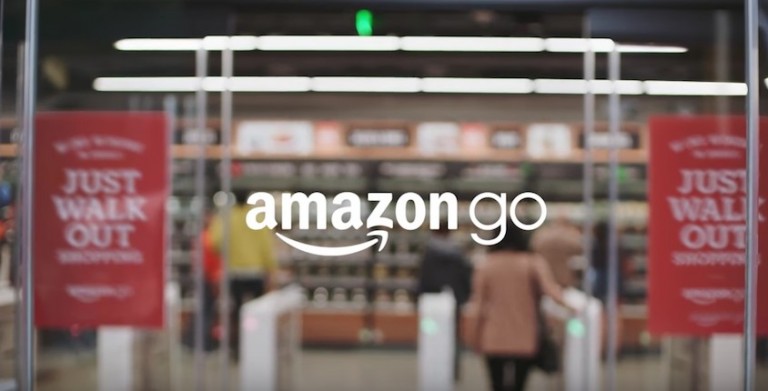On December 5th, Amazon released a video of what we all thought might be coming, but in fact is a lot closer than we think.
Actually, it is already here.
In the video that lasts less than two minutes, we see people scan into the grocery story using an app on their phone and then pick items off of the shelves and walk directly out of the store without paying at a checkout. Through algorithms and similar technology found in driverless cars, the store knows which items are taken and automatically charges your card through a virtual shopping cart, almost like you were online shopping.
And while this is certainly fascinating and something that would save all of us some time during our shopping routines, I can’t help but to think that this is merely the tip of the iceberg, and that drastic change is going to happen fast.
This shift is real and it is already happening.
According to the Bureau of Labour Statistics, there are 4.6-million Americans working in retail sales while 3.4-million more work as cashiers, making up almost six percent of total U.S. employment. And while you might think that there may need to be support staff for restocking shelves and cleaning spills, etc. you’re right, but automation of these jobs isn’t far off now.
But lets not forget about a month ago when 50,000 beers were delivered in Colorado by a driverless truck. And lets not forget that according to the American Trucking association, there are approximately 3.5 million truck drivers. All of these jobs are at risk too.
But what about other jobs that have a high chance of being automated? How many people are working in each profession? Just because we haven’t seen the video yet like we have for trucking and cashiers, here are a few:
Accountants? Over 1.3 million.
Lawyers? ~.8 million.
Servers? 2.5 million.
Insurance underwriters? .5 million
Secretary and admin assistance? ~4 million.
Although the list may go on (for quite a while), I’m going to stop there.
Doing some quick adding, the jobs I mentioned add up to a figure quite staggering:
20.6 million.
20.6 million. Conservatively. And without going into details of other professions (which there are plenty of), know that the automation does not stop here.
But while instilling fear isn’t a goal of my articles, and optimism is, I believe we have an opportunity to have more of our days back.
I believe we have an opportunity to consider liberal arts as a leading degree.
I believe that we will increasingly value creativity, problem solving, and social skills. Where critical thinking will be second-to-none and we are trained to adapt and evolve with the world around us to make the best decisions for ourselves.
I believe we will be educated as ‘thinkers’ that ‘do’, and not ‘doers’ that occasionally ‘think’.
I believe that there will be more flexibility and free time to work on the world we live in and not in it.
I believe that we will adopt something along the lines of a Universal Basic Income (UBI), and that people will be more free to do good in their communities.
I believe that we will be able to connect with people in ways that we haven’t been able to for years because the lack of focus on people and relationships, and the glorification of ‘hustle’ and ‘busy’.
First, there is going to be fear. Change is scary. There will be millions of jobs lost and it will take a generation to accept it. But as the next generation adjusts, a new generation of automation will be taking place simultaneously.
But lets keep in mind too that we are all on the pursuit of happiness, and while this transition may be drastic, the opportunities to do things we simply didn’t have the time or resources for will become even greater.
Exponential change is happening and whether we like it or not, we’re going to just have to (Amazon) Go with it.
****
Follow Eric on Twitter, LinedIn, or Facebook. Check out his new book here, and his TEDx video here.
This is a Contributor Post. Opinions expressed here are opinions of the Contributor. Influencive does not endorse or review brands mentioned; does not and cannot investigate relationships with brands, products, and people mentioned and is up to the Contributor to disclose. Contributors, amongst other accounts and articles may be professional fee-based.

